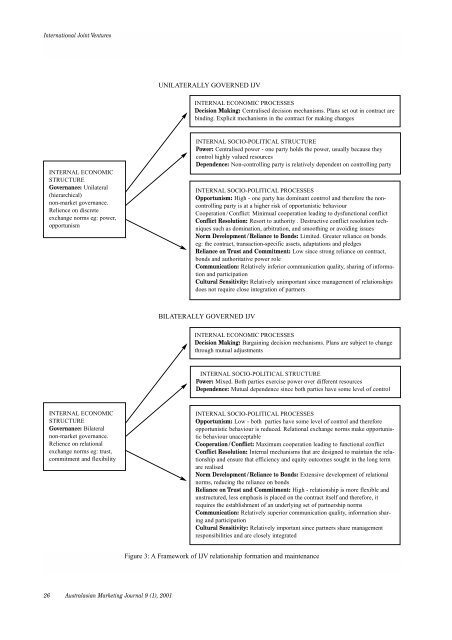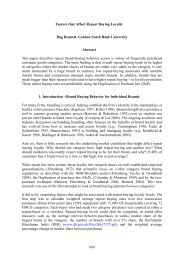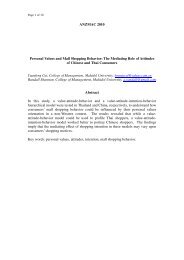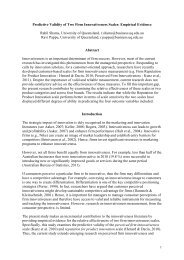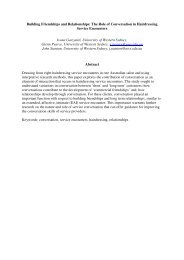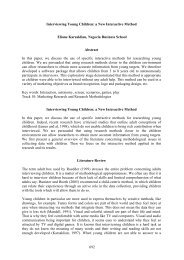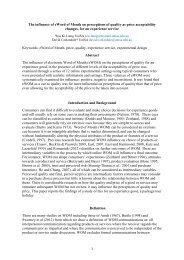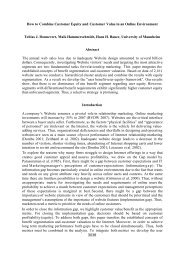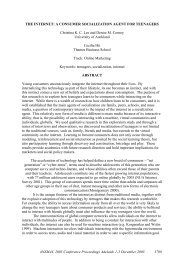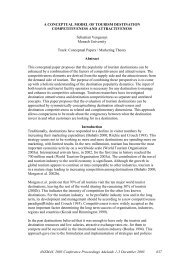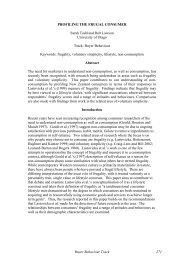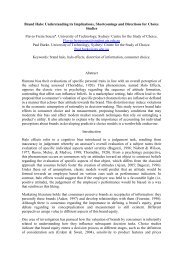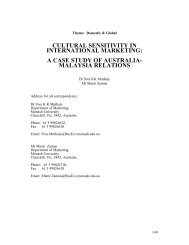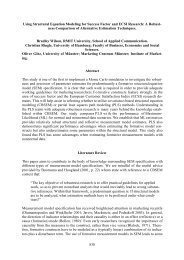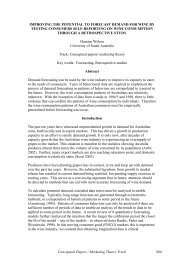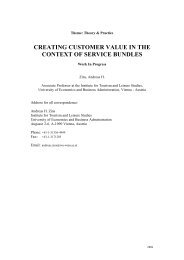amj Australasian Marketing Journal - ANZMAC
amj Australasian Marketing Journal - ANZMAC
amj Australasian Marketing Journal - ANZMAC
You also want an ePaper? Increase the reach of your titles
YUMPU automatically turns print PDFs into web optimized ePapers that Google loves.
International Joint Ventures<br />
INTERNAL ECONOMIC<br />
STRUCTURE<br />
Governance: Unilateral<br />
(hierarchical)<br />
non-market governance.<br />
Relience on discrete<br />
exchange norms eg: power,<br />
opportunism<br />
INTERNAL ECONOMIC<br />
STRUCTURE<br />
Governance: Bilateral<br />
non-market governance.<br />
Relience on relational<br />
exchange norms eg: trust,<br />
commitment and flexibility<br />
26 <strong>Australasian</strong> <strong>Marketing</strong> <strong>Journal</strong> 9 (1), 2001<br />
UNILATERALLY GOVERNED IJV<br />
INTERNAL ECONOMIC PROCESSES<br />
Decision Making: Centralised decision mechanisms. Plans set out in contract are<br />
binding. Explicit mechanisms in the contract for making changes<br />
INTERNAL SOCIO-POLITICAL STRUCTURE<br />
Power: Centralised power - one party holds the power, usually because they<br />
control highly valued resources<br />
Dependence: Non-controlling party is relatively dependent on controlling party<br />
INTERNAL SOCIO-POLITICAL PROCESSES<br />
Opportunism: High - one party has dominant contrrol and therefore the noncontrolling<br />
party is at a higher risk of opportunistic behaviour<br />
Cooperation / Conflict: Minimual cooperation leading to dysfunctional conflict<br />
Conflict Resolution: Resort to authority . Destructive conflict resolution techniques<br />
such as domination, arbitration, and smoothing or avoiding issues<br />
Norm Development / Reliance to Bonds: Limited. Greater reliance on bonds<br />
eg: the contract, transaction-specific assets, adaptations and pledges<br />
Reliance on Trust and Commitment: Low since strong reliance on contract,<br />
bonds and authoritative power role<br />
Communication: Relatively inferior communication quality, sharing of information<br />
and participation<br />
Cultural Sensitivity: Relatively unimportant since management of relationships<br />
does not require close integration of partners<br />
BILATERALLY GOVERNED IJV<br />
INTERNAL ECONOMIC PROCESSES<br />
Decision Making: Bargaining decision mechanisms. Plans are subject to change<br />
through mutual adjustments<br />
INTERNAL SOCIO-POLITICAL STRUCTURE<br />
Power: Mixed. Both parties exercise power over different resources<br />
Dependence: Mutual dependence since both parties have some level of control<br />
INTERNAL SOCIO-POLITICAL PROCESSES<br />
Opportunism: Low - both parties have some level of control and therefore<br />
opportunistic behaviour is reduced. Relational exchange norms make opportunistic<br />
behaviour unacceptable<br />
Cooperation / Conflict: Maximum cooperation leading to functional conflict<br />
Conflict Resolution: Internal mechanisms that are designed to maintain the relationship<br />
and ensure that efficiency and equity outcomes sought in the long term<br />
are realised<br />
Norm Development / Reliance to Bonds: Extensive development of relational<br />
norms, reducing the reliance on bonds<br />
Reliance on Trust and Commitment: High - relationship is more flexible and<br />
unstructured, less emphasis is placed on the contract itself and therefore, it<br />
requires the establishment of an underlying set of partnership norms<br />
Communication: Relatively superior communication quality, information sharing<br />
and participation<br />
Cultural Sensitivity: Relatively important since partners share management<br />
responsibilities and are closely integrated<br />
Figure 3: A Framework of IJV relationship formation and maintenance


